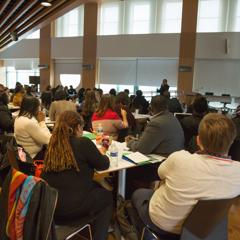Community-led Resilience: Reflections from the Vital Village Network Leadership Summit
In December 2015, the Vital Village Network hosted a 2-day Leadership Summit. Day 1 was an intensive 1/2 day Dynamic Leadership workshop focused on developing leadership skills and building community capacity, and the Day 2 was a full day of presentations, workshops, panel discussions, and breakout sessions led by our community partners (and featuring a keynote address by Chief Resilience Officer for the City of Boston, Dr. Atiya Martin).
We divided the Leadership Summit into 3 tracks: Tools for Parent & Community Engagement; First 2,000 Days; and Community Education & Advocacy. Each track gave our partners the opportunity to highlight their cross-sector work and collaborations to build resiliency and protective factors and address ACEs, trauma, and toxic stress. Some examples include: the creation of trauma-informed group prenatal and well child care (First 2,000 Days), training teachers on trauma-informed practices and providing tools for students to regulate their emotions in the classroom (Community Education & Advocacy), and using digital storytelling to increase awareness around ACEs and resiliency (Tools). At the conclusion of the Leadership Summit, each individual or team in attendance launched a "90-Day Challenge." To facilitate the success of our partners, the Vital Village Network has been providing ongoing support, coaching, skill-building, and network collaborations.
The Leadership Summit was a powerful demonstration of the value of co-design. Building community capacity requires a power shift and co-design is a method of achieving this. Co-designing demands a more fluid interpretation of the word expert and recognizes that lived experiences are often more valuable than degrees and research publications. It is also an opportunity to shift decision making power, such as designing a conference agenda and selecting meeting content, to individuals who rarely engage in this process. Frequently, conferences minimize the importance of lived experience and even alienate these individuals because of their overuse of jargon, the rigid session format, and similar meeting elements. Co-designing the Leadership Summit with our network partners was an important shift from the traditional approach to event planning. Furthermore, Vital Village Network recognizes that we have an abundance of experts in our target communities. We are privileged to collaborate with these change agents and wanted to provide a space to showcase their accomplishments.
The 90-Day Challenge also demonstrated the power of collaboration. The 90-Day Challenge originated at the 2014 Leadership Summit and was a means for establishing accountability, transparency, and collective identity. We hoped to build on last year's success and launched our second round of challenges after the summit. At the March 2016 network connection meeting, network partners shared their successes from the last 90 days. Boston Children's Museum presented on their Listening Tour, conversations to better understand people's aspirations for the children and families in their community, the concerns they have, and what they believe might make a difference in strengthening the community. Their efforts to increase community engagement also affected their organizational culture and inspired conversations on race, class, and cultural humility. The presenters obtained valuable input from meeting attendees on next steps and identified opportunities for future collaborations with organizations represented at the meeting. An additional idea launched at the summit was a network-wide 90-Day Challenge in 2016, and we continue to learn our way forward with this more ambitous goal.
We strive to have quality improvement methods wedded to community-based participatory approaches, and have this orientation permeate all organizational activities instead of being confined to a specific project or segment of the year. Our goal is for all network partners to adopt this approach so that accountability, transparency, and collective identity are foundational components of Vital Village Network's success.


